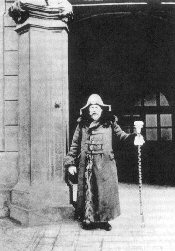 |
 |
|||



A Reply to Dix' «Kafka Imagining America»
by Justin N. Smolin
I must admit, I have neither the knowledge nor the expertise to write a proper response to such a brave and finely written essay; however, I do wish to set out a few objections which occur to me against Dr. Dix’ thesis.
The thing that most troubles me (and I am not ashamed of stating it out right, although to do so is to risk offence and misunderstanding) is the essay’s anti-Americanism, which (although it couches itself in Kafka’s language), seems to me to be at heart only a variant of the sort of vague, Europhile anti-Americanism so widely prevalent in the sort of academic circles Dr. Dix presumably frequents. I am not convinced that this sort of anti-Americanism is really wrong; it is a natural reaction against the arrogant, unilateralist behavior of the world’s only superpower, and, as such, it plays a positive role as a badly needed counterbalancing force. However, even in its role as a positive force, it is clearly a part of the system of social interactions Dr. Dix is urging us to withdraw from. That Amerika is a book intent on dissembling (and therefore in some way eliminating) social structure, I am inclined to agree with; that it is a book that, in some indirect manner, reflects a European criticism of the utopian America of Kafka’s time, I am also inclined to agree with. But to construct from this a definite anti-Americanism, and to attempt to identify this new anti-Americanism with Kafka, Dickinson, and even literature itself, seems to me to be dishonest, an underhanded capitulation to the sort of fashionable political attitudes Kafka would have turned up his nose at (or, at the very least, ignored).
Moreover, I am doubtful whether the Nietzschian overtures with which Dix ends his article are entirely appropriate. Kafka saw his own situation in almost entirely negative terms, as an imprisonment in “darkness without even the warmth of darkness”; he had “only as much as ground as his two feet [took] up, only as much of a hold as his two hands encompa[ssed].” That he probably also viewed this position as in some way an elevated one, as a “waver[ing] on the heights,” cannot be denied; but, all the same, I do not think that he would have advocated it as the best and highest way of life, or even as the most elevated artistic position.
Besides, Dr. Dix must surely recognize that this idea of the artist as individualist, as someone who acts “as if she were a small country declaring her sovereignty,” is derived from (or, at the very least, presently associated with) the American values of self reliance and “rugged individualism.” Presumably, therefore, a Kafkan criticism of America would condemn the country for becoming a solipsism (or, to put it more plainly, a nation full of little solipsisms); not, as Dix does here, for upholding “the Law,” the community ideal, for becoming too much of an oppressive structure. That this assertion sounds like heresy, tantamount to a betrayal of America, perhaps even the “free West” and the whole of enlightened modern civilization-this is why we must really be on our guard against America and Americanization.

